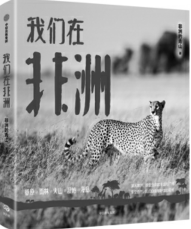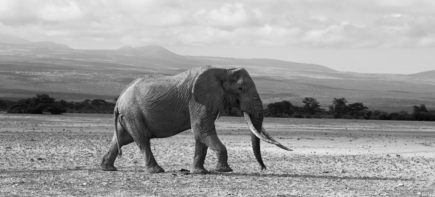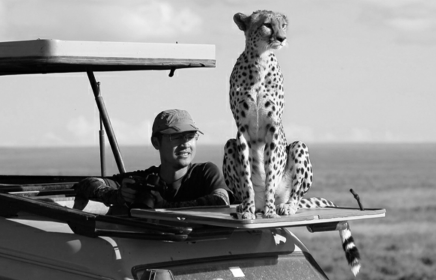Author sheds emotional light on Africa's wild life

At the beginning of 2020, Chen Jianxing experienced an unforgettable month with a hedgehog. When COVID-19 was spreading in Africa, he could not buy a plane ticket home and was stuck in a scarcely visited Serengeti National Park in Tanzania, where he formerly worked, and didn't know where to go.
It was the rainy season, and seeking shelter in his tent he found a hedgehog, the nest of which he later found out had been flooded by heavy rain. He made a new nest and fed the animal, and the two quickly became friends.
Feeling confused and depressed over the spread of the pandemic, it was a tough time for Chen, whose only company was the hedgehog. Chen felt he was experiencing a similar situation to the film Life of Pi, building a special bond with an animal during a hard time.
This is just one of many captivating stories that the man who has spent 15 years observing wild animals in Africa can recount. Many of them appear in his recently published book We Are in Africa, which tells of his encounters with wild animals in Africa and his thoughts about the experiences.
The book introduces dozens of wild animals living in different ecosystems in Africa, from grassland and rainforest, to volcano, wetland and island. The book has garnered 9.4 points out of 10 on China's popular review site Douban.
Chen, 45, is an acclaimed author, who has written and translated 10 books. He says he used to focus on wild animals in East Africa, and this book "has a broader scope and covers the ecological areas of a dozen sub-Saharan African countries".
Just as his books inform readers, he, himself, has learned from his wild animal friends. For example, he illustrates in this book his experience with cheetahs.
According to Chen, despite the cheetah being one of the fastest animals on land, it suffers great difficulties since its evolution has enhanced the big cat's running ability, but at the expense of forelimb strength and bite force. As a result, it's actually one of the "weaker" animals on the grassland compared with others, and its prey is often taken away by lions and vultures.
"Although it's relatively weak, it behaves with no trace of shyness or complaint, but seems elegant and confident, wandering in an unhurried way on the grassland, seemingly living its best life, despite its shortcomings. That is so attractive to me, and reminds me to learn from such an attitude," says Chen.
He also mentions elephants in the book as being strong animals without natural enemies thanks to their huge size, but also struck with deep emotions. "Elephants mourn their dead. When their mate dies, the herd holds a funeral, during which other elephants touch or dump soil on their fallen compatriot with their trunks," says Chen.
He spent three years observing an old elephant at the foot of Mount Kilimanjaro, which always wandered around a small forest by itself instead of migrating to new pastures with its herd.
"I didn't understand the reason behind this abnormal activity until I discovered the bones of another elephant in the forest. Then I realized the elephant I observe was probably tending to the remains of its mate," says Chen.
His observation has influenced his outlook on life. "Influenced by Social Darwinism, people often believe the world of wild animals is uncompromising, and use phrases like 'the law of the jungle' to refer to the crueller side of human society," says Chen.
"But through my own observations, and discussions with other scholars, I find people tend to exaggerate the competition between wild animals, but ignore their altruistic and communal behaviors," he adds.
Moreover, animals possess similar emotions, creativity, thinking methods and communication abilities to people, according to Chen.
"Through this book, I want to tell the animals' stories, guide more people to care for wild animals, enhance people's understanding of nature and promote the protection of their environment," he adds.
Having worked for Tanzania National Parks for seven years, Chen continues observing animals as a freelancer and spends nine to 10 months in Africa every year. He cooperates with local research institutes to provide videos and photos for their research, and is currently carrying out a public welfare project in Tanzania.
"This is a heartfelt masterpiece that showcases the various ecosystems of Africa, exquisite and aweinspiring," says Shi Zhan, a professor at the Institute for the Global History of Civilizations, Shanghai International Studies University.
"These moments of brilliance and vividness, as well as the quiet and melancholy stories, offer a glimpse into another world for those who have long been trapped among the confines of the city, allowing them to experience the intertwining of wilderness and warmth," he adds.



Today's Top News
- How China's initiatives are paving a new path to a better world
- Another sign of Japan's right-wingers' dangerous ambition to break free of all postwar constraints
- Hainan's special customs operations start strong
- Macao SAR holds flag-raising, reception to mark 26th anniversary of return to motherland
- China issues rules to regulate pricing practices of internet platforms
- US hits over 70 IS-linked targets in Syria in massive retaliatory strikes






























